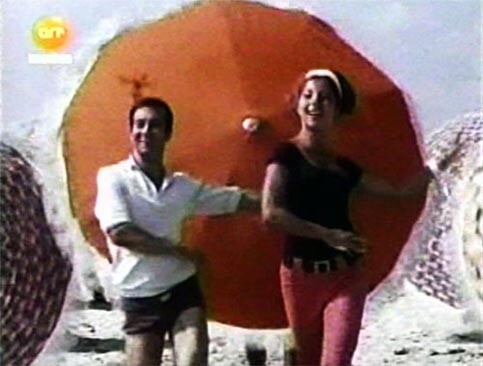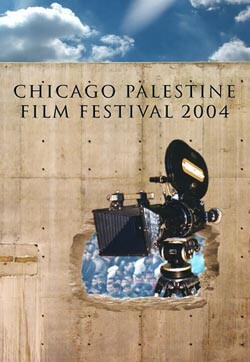The Electronic Intifada 6 June 2004

A film still from Arabs A Go-Go
Jaqueline Salloum, creator of the two short films Planet of the Arabs and Arabs A Go-Go, has that rare ability to make something totally unfunny humorous while not cheapening its seriousness. In her ten minute video montage Planet of the Arabs, which is a compilation of smartly edited clips of Hollywood films with Arab characters, set to a heavy-metal guitar riff, is packaged as a movie trailer complete with rave reviews like, “Planet of the Arabs is even more racist than the New York Post,” from the New York Post. And Arabs A Go-Go, a two minute music video that is also comprised of found material from Arab dramas, musicals, and romantic comedies, features “footage of Arabs as you’ve never seen them before — unless you’re an Arab,” as Salloum’s website informs.
Planet of the Arabs, similar in concept to last year’s Chicago Palestine Film Festival feature film Lord’s Song in a Strange Land, addresses the stereotypical, “dehumanized” film portrayals of Arabs as terrorists, bulbous-nosed ignoramuses, and wife-beaters. Even high-brow television shows like Law and Order have no problem with portraying an Arab Muslim as anti-Semitic and making praying to Allah sound like a bad thing. Islam is about suicide bombing, it is implied, and somehow Allah is inherently different from the god worshipped by Jews and Christians.

Lavishly designed musical sets feature suggestive belly dancers and mid-century dramas don’t seem that much different from their American counterparts from the time period. Salloum leaves her audience drawing the conclusion that Arab entertainment doesn’t seem so far off from that seen on American T.V.s after all. This may come as a surprise for some, but as Salloum wryly points out on her website, to those who grew up knowing something of Arab culture other than the grotesque charicacture presented by Hollywood, there is nothing contradictory about what is shown in the film.
But, as Kathleen Christison writes in her book Perceptions of Palestine, U.S. leaders have their opinions of Arab culture shaped by Hollywood entertainment. Just a matter of days ago General Mark Kimmit, who is overseeing the U.S. military in Iraq, said, while discussing accusations that U.S. forces fired upon an Iraqi wedding party, “One could say, yes, it is true that out in the desert you need to have a rifle to protect yourself against Ali Baba but the necessity for rocket-propelled launchers, rocket launchers in the bottom, special machine guns may be a little much for Ali Baba out there.”

A film still from Planet of the Arabs
Upon watching Salloum’s film, it appears as though depictions of Arabs and Muslims are exempt from the politically correct standards of contemporary entertainment. Salloum rightly includes a television drama clip in which a yokel of a young man explains to serious-faced authorities that while he has to use euphemisms while talking to his buddies about the African Americans and gays that they so loathe, because of pervasive racist attitudes towards Arabs, they feel comfortable with boldly using the slur “sand nigger.”
Based off of Jack Shaheen’s excellent anthology Reel Bad Arabs, which categorically catalogues depictions of Arabs in American film, Planet of the Arabs, while not without humor, reminds us that racist depictions of Arabs in American entertainment is a huge problem. And Arabs A Go-Go is Salloum’s modest attempt to contradict the tripe that Hollywood presents as Arab culture.
Maureen Clare Murphy is Arts, Music, And Culture Editor for EI and graduated from The School of the Art Institute of Chicago this May.
Related links




